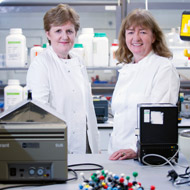
The Moredun Group signs Memorandum of Agreement with Edinburgh Napier University
Edinburgh Napier University has formalised a partnership with The Moredun Group - a world renowned institute committed to promoting livestock health and welfare through research and education.
Based in Penicuik, just south of Edinburgh, The Moredun Group has signed a Memorandum of Understanding with the university that will see greater collaboration between the institution's researchers.
The pair have already worked together on a variety of projects - from testing vaccines to combat parasites to examining farmers' attitudes to emerging livestock diseases such as the Schmallenberg virus.
New research will concentrate on land management issues, specifically with regard to livestock health and long term food security. There will also be a focus on understanding the sociological implications of new policy and uptake of new interventions.
Professor Andrea Nolan, principal and vice-chancellor of Edinburgh Napier University, said that the agreement builds on its long-standing and successful relationship with Moredun and its highly-respected team of researchers.
“It will encourage more mutually beneficial cross-working and development opportunities for our staff, including opening up new areas for joint research projects that deliver real impact for farmers, landowners and the public.”
Professor Julie Fitzpatrick, Moredun Research Institute scientific director & group CEO, said: “We are delighted to be working more closely with Edinburgh Napier University and can see real benefits from the opportunities provided by interdisciplinary collaboration to enable both organisations to make a real impact in enabling new technologies and developments to be used effectively where they are most needed.”
Image (C) Jane Barlow/Edinburgh Napier University



 HMRC has invited feedback to its communications regarding the employment status of locum vets and vet nurses.
HMRC has invited feedback to its communications regarding the employment status of locum vets and vet nurses.